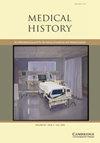Xiaoping Fang, China and the Cholera Pandemic: Restructuring Society under Mao (Pittsburgh, PA: University of Pittsburgh Press, 2021), pp. 312, $55.00, hardback, ISBN: 9780822946625).
IF 0.9
2区 哲学
Q4 HEALTH CARE SCIENCES & SERVICES
引用次数: 0
Abstract
By braiding together multiple environmental and social factors – ranging from land and water transportation networks, festivities, seafood-eating habits, agricultural cycles, and intensified population gathering during ‘Shuangqiang, or the quick harvesting and planting of rice crops’(p. 3) – Fang presents an ecosystem that set the scene for Zhejiang’s cholera outbreak in July 1962. Cholera had a greater impact in rural areas owing to the poor water-management infrastructure there;women participated in agricultural production, making their infection rate equal to men’s;and the superior nutrition and limited contact with civilians on military bases explains the lower caseload among soldiers. [...]the book can also be read as an account of the resistance, confrontations, and negotiations that occurred between various strands of power in moving towards that style of governance, which was not without its blind spots: public health staff encountered difficulties and even violence when attempting to check inoculation certificates of officers in the People’s Liberation Army (Chapter 4);overseas Chinese were exempted from vaccination certificate checks because the PRC needed their remittances and skills (Chapter 4);and the Zhejiang government adapted its 1963 vaccination campaign to avoid peak farming season due to the passive participation of local cadres and farmworkers the previous year (Chapter 6).方小平,《中国与霍乱大流行:毛领导下的重构社会》(宾夕法尼亚州匹兹堡:匹兹堡大学出版社,2021年),第312页,55美元,精装本,ISBN: 9780822946625)。
通过将多种环境和社会因素结合在一起,包括陆运和水运网络、庆祝活动、海鲜饮食习惯、农业周期以及“双强”期间人口聚集的加剧,即水稻作物的快速收获和种植。3) -方呈现了一个生态系统,为1962年7月浙江霍乱的爆发奠定了基础。霍乱在农村地区的影响更大,因为那里的水管理基础设施较差;妇女参与农业生产,使她们的感染率与男子相当;士兵的营养状况较好,与军事基地的平民接触较少。[…这本书也可以被解读为在走向这种治理方式的过程中,各种权力之间发生的抵抗、对抗和谈判,这种治理方式并非没有盲点。公共卫生人员在试图检查人民解放军军官的接种证书时遇到困难甚至暴力(第4章);海外华人被免除接种证书检查,因为中国需要他们的汇款和技能(第4章);由于前一年当地干部和农场工人的被动参与,浙江政府调整了1963年的疫苗接种运动,以避免农业旺季(第6章)。
本文章由计算机程序翻译,如有差异,请以英文原文为准。
求助全文
约1分钟内获得全文
求助全文
来源期刊

Medical History
医学-科学史与科学哲学
CiteScore
1.60
自引率
0.00%
发文量
25
审稿时长
>12 weeks
期刊介绍:
Medical History is a refereed journal devoted to all aspects of the history of medicine and health, with the goal of broadening and deepening the understanding of the field, in the widest sense, by historical studies of the highest quality. It is also the journal of the European Association for the History of Medicine and Health. The membership of the Editorial Board, which includes senior members of the EAHMH, reflects the commitment to the finest international standards in refereeing of submitted papers and the reviewing of books. The journal publishes in English, but welcomes submissions from scholars for whom English is not a first language; language and copy-editing assistance will be provided wherever possible.
 求助内容:
求助内容: 应助结果提醒方式:
应助结果提醒方式:


